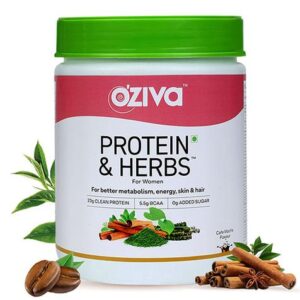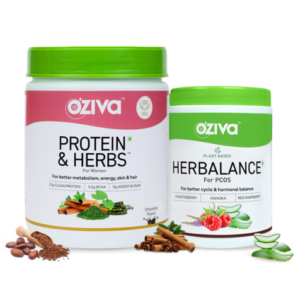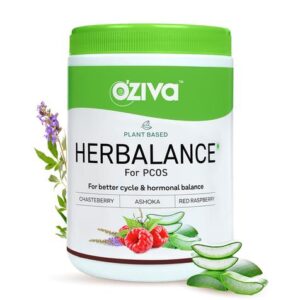If you or any of your loved ones are facing PCOS, an increasingly common method to deal with PCOS symptoms is to add certain PCOS supplements like vitamins and minerals to your diet. These PCOS supplements help you deal with symptoms by helping you maintain hormonal balance, or helping to reduce acne or facial scarring that comes along with PCOS.
But the world of PCOS supplements to add to your PCOS diet is vast. So how do you know which ones to rely on? Which ones will be most effective for you and your body?
These are the questions we will answer in this article.
5 Great PCOS Vitamins & Minerals
Before we explain which vitamins and minerals are useful for PCOS, let us insist that you only take them in your diet through supplements that are clean, plant-based and useful for your body’s needs. All the vitamins suggested below are present in OZiva products, which are safe for long-term consumption.
-
Inositol (Vitamin B8)
Inositol is a kind of carboxylic sugar naturally found in several foods like nuts, fruits, beans, and grains. Inositol offers very strong antioxidant properties. Most people make enough inositol internally in their bodies. However, one of the PCOS symptoms means your body might not be able to make enough inositol naturally, so you have to take it.
Inositol works to control serum insulin levels in your body. It helps improve blood sugar levels in women with PCOS. Research has also confirmed that it can help balance hormones by lowering overall testosterone levels. You can take inositol for both of these effects.
OZiva HerBalance for PCOS contains overall 500 mg Inositol which can also help improve fertility.
-
Zinc
Zinc is one of the most critical minerals that you need for the human body. It is responsible for the regulation of cell growth, release of any hormones, reproduction, and promoting better immune response.
Research has shown that women who have been living with PCOS could be having lower levels of zinc in their bodies than women without PCOS. This means that these women could be seeing markers of oxidative stress. This could include insulin resistance, and difficulty metabolising hormones (contributing to hormonal imbalance).
Zinc can positively affect insulin resistance and lipid balance. Zinc can also help reduce the pain associated with menstruation, particularly during irregular period cycles. Finally, other studies have confirmed that zinc can be tremendously beneficial when it comes to reducing acne, signs of inflammation, and hair loss. These are all symptoms associated with PCOS, and can cause irritation. So pick up OZiva Bettr.Zinc+, which can help with both immunity, and reduction of acne and inflammation. These clean, plant-based capsules contain plant-derived Zinc.
-
Magnesium
Did you know that if you have PCOS, even if you are of healthy weight, you could be facing insulin resistance? Insulin resistance can lead to Type-2 Diabetes, a long-term PCOS symptom. It can also drive the hormonal imbalance inside your body. Research has shown that those who have Type 2 diabetes might also have a magnesium deficiency. The same goes for insulin-resistant people. Top up on your magnesium levels through plant foods like nuts, seeds, beans and legumes.
-
Vitamin D
Women with PCOS often have lower levels of Vitamin D in their bodies. Supplementation of Vitamin D for women might help improve the regularity of their menstrual cycles (if taken regularly). It may also help improve fertility of women with PCOS and their reproductive health.
Vitamin D is also a major mood booster. One of the lesser-known PCOS symptoms is that hormonal imbalances can also affect mood. One day, you could be feeling suddenly low without any warning or reason. Vitamin D can help improve your mood and boost your levels of happiness.
-
Vitamin C
Vitamin C is well-known for two things. It is a natural skin brightener and has strong immune responses in the body. However, for women with PCOS, Vitamin C is helpful as a strong antioxidant that reduces the markers of oxidative stress.
Vitamin C can also help reduce the risk of advanced ageing in the ovary. Ovarian cysts are a common and painful PCOS symptom. Vitamin C can significantly inhibit the growth and formation of ovarian cysts in the body. Vitamin C, combined with bioflavonoids, can support healthier progesterone levels and stabilise the cortisol in your body.
You can get vitamin C naturally from citrus fruits, as well as natural antioxidants like red raspberry. OZiva HerBalance for PCOS contains Red Raspberry, which is a natural source of Vitamin C and has strong positive effects for PCOS.
Last modified: September 4, 2022





